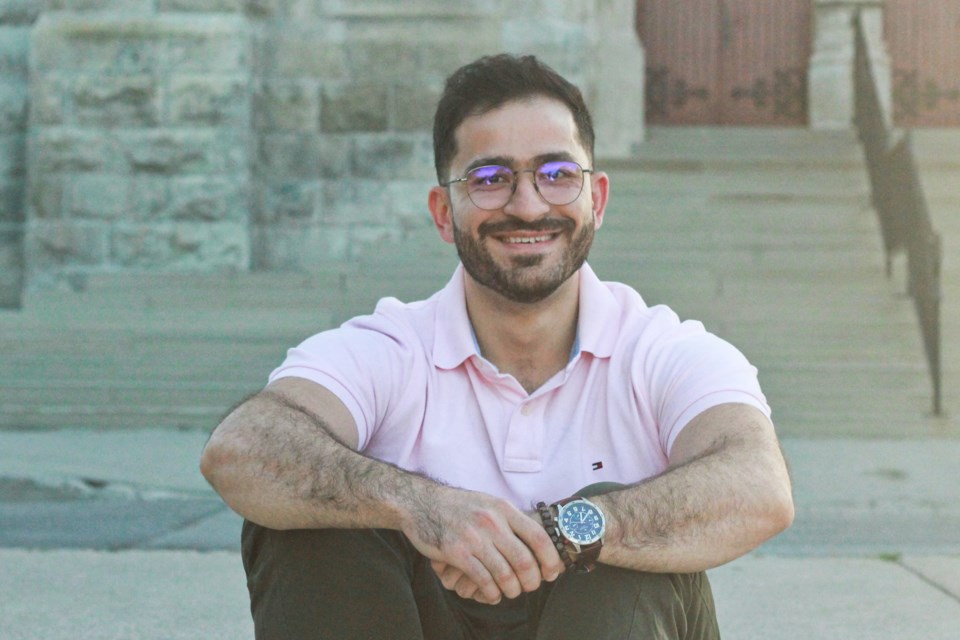"I called my father and I said ‘I have to see you. It has been a very long time.’ When I call him, he’s crying sometimes and I can’t do anything." — Tamim Holoubi
Tamim Holoubi says for Syrian refugees, being with their families is "like a luxury."
Haloubi entered Canada as a refugee in 2016 and hasn’t been together with his undivided family in over a decade.
“Now all the Syrians are all around the world. It’s a big crisis,” says Holoubi, who now calls Guelph home.
A crisis it is, as Syrians settled around the globe after the war broke out there in 2011.
According to the United Nations High Commissioner for Refugees, over 70,000 Syrian refugee families live without their fathers and thousands of refugee children were torn from both parents.
This break-down in family structure impacts each member emotionally and economically.
With many suffering physical, emotional, psychological, and spiritual trauma, Sanctuary Refugee Health Centre clinical social worker, Asmaa Cober says the trauma of displacement is an added obstacle for the thousands of refugees she meets within the Guelph Wellington, Waterloo and Kitchener area.
Holoubi says his family was torn apart as each member had to look for a liveable destination to move to.
“The situation is dangerous (in Syria) especially for boys at my age. The army would immediately take all the boys, all the guys, and force them to go to the army where all the massacres happen,” says Holoubi.
“I decided I didn’t want to be involved in what's happening so I decided to leave.”
After the war, Holoubi found a future in Guelph, his sister moved to Edmonton, another sister in Turkey, his three brothers in Oman and another brother and sister, along with his parents, remain in Syria.
The search for a country to call home wasn’t exactly smooth for any of them.
According to the Faith to Action initiative — an organization that responds to the needs of orphans and vulnerable children around the world — disconnection from families has a different outcome in Syrian children because many of them work in neighbouring countries such as Lebanon, Jordan and Turkey where there are already millions of Syrian refugees in refugee camps.
Just like millions of Syrian refugees, Holoubi first moved to Egypt from Syria in 2012. Due to the uprising there, he concluded that Turkey would be more suitable for him in the long run after his two months in Egypt.
“What I expected happened. Egypt was a bad place because another crisis happened. At that time, many Syrians left Egypt and fled to Turkey,” says Holoubi.
“My father specifically decided to stay in Aleppo. He’s a doctor and he’s 70 years old. He told me, ‘son I’m getting old. I’ve got family and friends here and a life and a home. I’m a doctor here I can help, many people need me here. You’re young and you’re looking for a future.’”
And so Holoubi settled in Turkey with a goal to provide a safe place for his sisters as the man of the family.
In the four years he lived there, he became fluent in Turkish, worked his way up to a financial manager role at the non-profit Syrian Social Gathering and helped provide a safe haven for his sisters.
Holoubi says despite the transition into Turkish life and culture, the government of Turkey continued to deal with Syrians as guests who weren’t given official status in the country, leading him to believe that Turkey too, cannot offer a secure future.
“The Syrians now in Turkey are being kicked out. That’s also the only reason that made me make this decision,” says Holoubi who applied for Canadian citizenship and swiftly received a call from the Canadian embassy giving him the opportunity to move to Canada in 2016.
Coming from a place of unrest, crisis and an unpromising tomorrow, Holoubi knew that Canada is a country he can call home.
“I know Canada and its laws and that it is very straightforward. You know your rights and you know your responsibilities. It is all clear,” says Holoubi who now works as a financial analyst at Danby Appliances.
Even though he is extremely appreciative of his life and his home here in Canada, he says his heart is in a constant state of worry for his family, particularly his ageing parents as he continually thinks about health, their safety and their ability to make a living.
Guelph Community Health Centre client care manager Jan Klotz says the long process of relocating is a real struggle within refugees and if there is a desire to bring families back, it can be a real challenge because of several moving parts.
She says the challenges of being separated from family are quite evident.
“There's a lot of stress, concern, loneliness, isolation. All of those things impact their experience here while they're trying to settle they're trying to build some stability,” says Klotz.
“It's difficult to manage and there is a lack of connection with the culture. You're in sort of a different place, a different culture and that disconnection can really increase anxiety, can increase feelings of depression for sure.”
For Haloubi, it wasn’t until a few months ago when his parents got a visa to travel to Oman that he finally got the opportunity to see his parents and brothers after six hard years.
“I called my father and I said ‘I have to see you. It has been a very long time.’ When I call him, he’s crying sometimes and I can’t do anything,” says Holoubi.
“And after the suffering of six years, I finally got to meet him.”
Seeing his son accomplish so much after all these years, Holoubi says he heard his father say the words that bring some peace to his aching heart which remains distant from his family.
“He said I’m proud of you. You’re the man,” says Holoubi.
